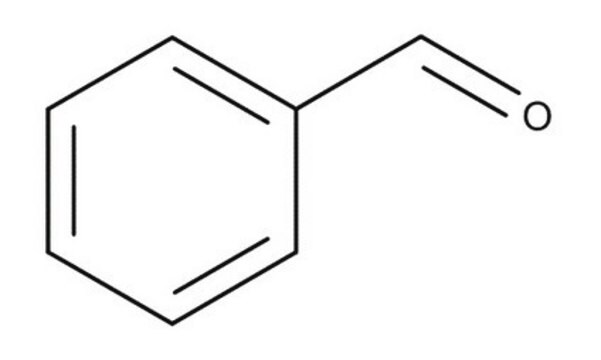1.01213
Ammonium thiocyanate
for analysis EMSURE® ACS,ISO,Reag. Ph Eur
Synonyme(s) :
Ammonium thiocyanate, Ammonium sulfocyanide, Ammonium rhodanide, Thiocyanic acid ammonium salt, Ammonium sulfocyanate
About This Item
Produits recommandés
Qualité
ACS reagent
Niveau de qualité
Agence
reag. ISO
reag. Ph. Eur.
Pression de vapeur
<1 hPa ( 20 °C)
Gamme de produits
EMSURE®
Essai
≥99.0% (silver nitrate titration)
Forme
solid
Puissance
500 mg/kg LD50, oral (Rat)
Impuretés
≤0.005% Insoluble matter
≤0.02% Iodine consuming substances
Résidus de calcination
≤0.025% (as sulfate)
pH
4.5-6.0 (20 °C, 50 g/L in H2O)
Pf
151 °C
Solubilité
1600 g/L
Densité
1.3 g/cm3 at 20 °C
Masse volumique apparente
600‑700 kg/m3
Traces d'anions
chloride (Cl-): ≤0.005%
sulfate (SO42-): ≤0.0025%
sulfide (S2-): ≤0.001%
Traces de cations
Cu: ≤0.0004%
Fe: ≤0.0001%
Pb: ≤0.0004%
heavy metals (as Pb): ≤0.0005%
Température de stockage
2-30°C
Chaîne SMILES
[S-]C#N.[N+H4]
InChI
1S/CHNS.H3N/c2-1-3;/h3H;1H3
Clé InChI
SOIFLUNRINLCBN-UHFFFAOYSA-N
Vous recherchez des produits similaires ? Visite Guide de comparaison des produits
Catégories apparentées
Application
- Redox Relay-Induced C-S Radical Cross-Coupling Strategy: This study showcases a novel application of ammonium thiocyanate in organic synthesis, specifically in nontraditional site-selective thiocyanation of quinoxalinones. This method highlights the versatility of ammonium thiocyanate in facilitating complex chemical transformations, useful in pharmaceutical and material science research (Shi et al., 2024).
- Reactant conversion-intercalation strategy toward interlayer-expanded MoS2 microflowers: Ammonium thiocyanate is utilized to enhance the supercapacitor performance of MoS2 microflowers, demonstrating its critical role in developing advanced materials for energy storage technologies. This application underlines the importance of ammonium thiocyanate in the field of material science, particularly in improving the electrochemical properties of nanoscale materials (Wang et al., 2023).
- Valorization and characterization of bio-oil from Salvadora persica seed for air pollutant adsorption: This research explores the environmental applications of ammonium thiocyanate, particularly in the adsorption and mitigation of air pollutants using bio-oil derived from natural sources. The study emphasizes the compound′s utility in environmental testing and pollution control strategies (Azizi et al., 2023).
- Layer-by-layer assembly of CsPbX3 nanocrystals into large-scale homostructures: In this application, ammonium thiocyanate is used in the precise assembly of perovskite nanocrystals, which are pivotal in the development of optoelectronic devices. The compound′s role in facilitating high-precision material assembly processes showcases its importance in cutting-edge scientific research and development (Cirignano et al., 2022).
- Study of MC:DN-Based Biopolymer Blend Electrolytes with Inserted Zn-Metal Complex for Energy Storage Devices with Improved Electrochemical Performance: Ammonium thiocyanate is used here to enhance the properties of biopolymer blend electrolytes, underscoring its significance in the development of high-performance energy storage devices. This application serves the needs of researchers focused on next-generation batteries and supercapacitors (Dannoun et al., 2022).
Liaison
Remarque sur l'analyse
Insoluble matter: ≤ 0.005 %
pH-value (5 %; water, 25 °C): 4.5 - 6.0
Chloride (Cl): ≤ 0.005 %
Sulfate (SO₄): ≤ 0.0025 %
Sulphide (S): ≤ 0.001 %
Heavy metals (as Pb): ≤ 0.0005 %
Cu (Copper): ≤ 0.0004 %
Fe (Iron): ≤ 0.0001 %
Pb (Lead): ≤ 0.0004 %
Residue on ignition (as sulfate): ≤ 0.025 %
Iodine consuming substances:
≤ 0.02 %
: ≤ 0.004 meq/g
Corresponds to ACS,ISO,Reag. Ph Eur
Informations légales
Mention d'avertissement
Danger
Mentions de danger
Classification des risques
Acute Tox. 4 Dermal - Acute Tox. 4 Inhalation - Acute Tox. 4 Oral - Aquatic Chronic 3 - Eye Dam. 1
Risques supp
Code de la classe de stockage
13 - Non Combustible Solids
Classe de danger pour l'eau (WGK)
WGK 1
Point d'éclair (°F)
Not applicable
Point d'éclair (°C)
Not applicable
Certificats d'analyse (COA)
Recherchez un Certificats d'analyse (COA) en saisissant le numéro de lot du produit. Les numéros de lot figurent sur l'étiquette du produit après les mots "Lot" ou "Batch".
Déjà en possession de ce produit ?
Retrouvez la documentation relative aux produits que vous avez récemment achetés dans la Bibliothèque de documents.
Les clients ont également consulté
Notre équipe de scientifiques dispose d'une expérience dans tous les secteurs de la recherche, notamment en sciences de la vie, science des matériaux, synthèse chimique, chromatographie, analyse et dans de nombreux autres domaines..
Contacter notre Service technique











